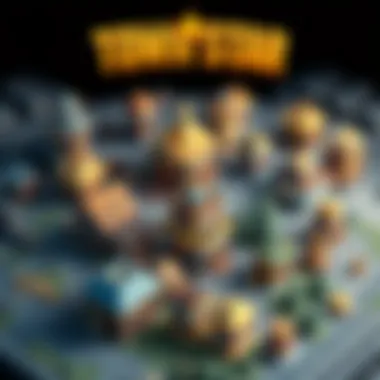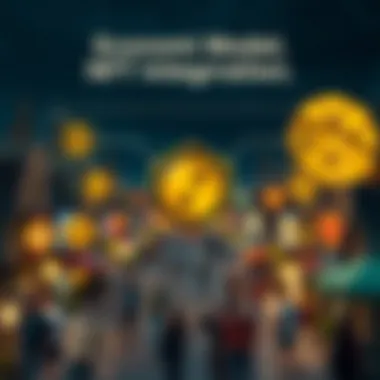Exploring Town Star: A Deep Dive into NFT Gaming


Intro
In the fast-evolving landscape of gaming, Town Star emerges as a noteworthy player, seamlessly intertwining the principles of traditional gaming with the burgeoning world of NFTs and blockchain. This game is not just another pixelated pastime; it's a window into the future of interactive entertainment where player ownership is as significant as the gameplay itself. Navigating through Town Star reveals a complex tapestry of strategic gameplay, economic potential, and the growing intersection of finance and leisure.
At its core, Town Star is built on the GALA Games platform, known for its unique approach to community and play-to-earn mechanics. Unlike conventional games where players often find their efforts evaporate into the ether, this NFT-driven game allows players to own, trade, and monetize their in-game assets. With this guide, we aim to explore the intricate layers of Town Star, highlighting gameplay nuances, strategies to thrive, and its broader implications on the NFT scene and cryptocurrency markets.
As we embark on this exploration, we recognize the urgency of understanding key trends shaping the crypto gaming environment. From the investment potential to the influence of blockchain on gameplay dynamics, the aim of this article is to provide a clear and informative path for investors, traders, analysts, and tech enthusiasts who wish to delve deeper into what Town Star has to offer.
With a focus on clarity, depth, and relevance, let’s begin our journey by examining the market landscape surrounding Town Star.
Foreword to Town Star
Understanding Town Star lays the groundwork for appreciating the intricate blend of gameplay and blockchain technology in the modern gaming landscape. This NFT game exemplifies how traditional gaming can pivot into the realm of decentralized digital economies. Players are not just consumers of content; they can also become stakeholders in a vibrant economic ecosystem.
Defining Town Star
Town Star, developed by Gala Games, is not just another simulation game; it represents a new frontier in interactive entertainment. By integrating blockchain features, Town Star allows players to build their cities while earning via non-fungible tokens (NFTs). The game mechanics resemble those of classic city-building titles, yet it incorporates a unique twist where every asset, be it a building or resource, can potentially carry monetary value in a broader marketplace.
The appeal of Town Star is multi-faceted. For players, it offers a chance to unleash creativity by constructing virtual environments. For investors, it is an enthralling opportunity to engage in a market that is still maturing. Unlike conventional titles where progress might be lost, Town Star provides assurance that players’ creations can be monetized, thus bestowing real-world value upon in-game efforts.
Origin and Development
The genesis of Town Star can be traced back to the burgeoning interest in blockchain technology and the gaming industry's grappling with adapting to it. Gala Games emerged from a simple declaration: "players should always own their in-game assets." This statement resonated widely, laying the foundation for a shift towards player sovereignty.
Developed by a team with strong ties to renowned titles, Town Star's development showcases a commitment to quality. Each update and feature addition harkens back to feedback from a growing community. The game evolved with a focus on accessibility, aiming not only at existing gamers but also at individuals who might be curious about the intersection of gaming and cryptocurrency. Thus, the evolution from initial concept to a fully functioning game is marked by a dedication to crafting an experience that is both engaging and meaningful.
Understanding these origins is critical; it speaks to the insights and lessons learned along the way in a constantly shifting market. As Town Star navigates this complex terrain, it continues to define its identity, aiming to strike a balance between entertainment and investment.
"In Town Star, every player has a part to play in shaping both their in-game cities and the overall landscape of NFT gaming."
For those eyeing investment opportunities, the story of Town Star serves as a cautionary tale and a beacon of hope. Its ongoing development reflects the challenges of merging traditional game design with revolutionary blockchain principles. As the game continues to grow, both gamers and investors must keep one eye on the horizon, watching to see how it will adapt and thrive.
Understanding NFTs in Gaming
The world of gaming has always evolved with technology. However, recently, a new player has emerged, and it’s reshaping how we think about gaming assets: Non-Fungible Tokens, or NFTs. Understanding NFTs is not just a passing interest for gamers but a vital part of how the industry is developing. They offer a unique set of advantages and challenges that affect game mechanics, ownership, and even monetization. This section will clarify what NFTs are and their significance, particularly in games like Town Star.
What are NFTs?
Non-Fungible Tokens are essentially digital assets that represent ownership of a unique item or piece of information on a blockchain. Unlike Bitcoin or Ethereum, which are interchangeable and have the same value, each NFT is distinct, often tied to digital items like art, music, or, in our case, virtual game assets.
- Key Characteristics of NFTs:
- Uniqueness: Each NFT has distinct metadata that distinguishes it from others. Think of it like a collector's item—no two NFTs are exactly alike.
- Ownership: NFTs provide proof of ownership, ensuring that the original creator or owner has verification of the asset.
- Transparency: Since NFTs are on the blockchain, every transaction is recorded, making it easy to trace an item’s history.
- Interoperability: Some NFTs can exist across multiple platforms, meaning a character or item in one game can potentially be used in another.
This unique combination of factors makes NFTs particularly appealing to gamers and developers alike.
The Role of NFTs in Town Star
In Town Star, NFTs are not just a gimmick; they are integral to the game's structure and player experience. Let’s break down how NFTs impact this vibrant gameplay:
- Ownership of In-Game Assets:
Players can own their buildings, resources, and other collectibles as NFTs. This ownership is crucial, as it allows players to trade or sell their items in secondary markets, similar to physical collectibles. - Economic Incentives:
The game uses NFTs to create an incentivized economy. Players can earn real value from their in-game achievements, making the gaming experience not only engaging but financially rewarding. - Enhanced Gameplay:
Because in-game assets are NFTs, players have more control over their gaming experience. Want to upgrade a building? You can do it. Planning to sell it for profit? Go right ahead. This flexibility fosters a more strategic approach to gaming. - Community Building:
NFTs can create a sense of belonging among players. Owners of rare NFTs often form tight-knit communities, leading to collaboration and social interaction. This can enhance the overall gaming experience, making it richer and more rewarding.


"The intersection of gaming and NFTs is not just a trend but a fundamental shift in how players interact with their games and each other."
Gameplay Mechanics
Gameplay mechanics serve as the backbone of any game, creating a framework that dictates how players interact with the game world. In Town Star, this framework is further enhanced by the integration of blockchain elements. The interplay between traditional gaming mechanics and the innovative features offered by NFTs enriches the gaming experience, allowing players to engage with the game in new and dynamic ways.
Game Objectives
Town Star encourages players to immerse themselves in city-building and resource management. The primary objective is to construct a thriving town while balancing various factors like resource allocation, production rates, and cash flow. Notably, players are tasked not only with creating an aesthetically pleasing town but also making sure it functions effectively.
The objectives in Town Star are multifaceted:
- Achieve Economic Growth: Players need to build an economy that supports growth. This includes producing goods, managing supply chains, and trading with other players.
- Complete Missions: Town Star features a mission system where players can earn rewards by completing specific tasks, providing extra motivation to progress.
- Compete in Rankings: By optimizing their town’s efficiency, players can find themselves climbing the leaderboard, a competitive aspect that taps into that innate desire to excel.
Furthermore, completing objectives comes with its own set of rewards, which could be in-game currency or unique NFTs that contribute to your town’s enhancement.
Resource Management
Efficient resource management is crucial in Town Star. Players find themselves juggling a variety of resources, each with its own unique characteristics and demands. The success of a town heavily relies on how well players can manage these resources, which include raw materials, goods, and finances.
Here are key resource management points to consider:
- Raw Materials: The game requires players to gather and utilize raw materials effectively. Identifying high-yield supply sources can significantly impact a player’s ability to grow their town.
- Production Chains: Establishing comprehensive production chains allows players to convert raw materials into valuable goods. Understanding these chains and optimizing them is essential.
- Cash Flow Management: Balancing expenditure and income is critical. Players need to make savvy decisions on investments versus saving, ensuring they are not running on empty.
Resource management is, in fact, not merely a strategy; it’s an art. The balance players strike between supply and demand can decide their fortunes in the game, emphasizing their need for a strategic mindset and attention to detail.
Building Structures
Building structures is a vital component of Town Star’s gameplay mechanics. Players interact with a two-fold process: they must decide which structures to build and where to place them in relation to their overall strategy.
- Types of Structures: Various types of buildings need to be constructed, including factories, shops, and homes. Each building offers unique benefits and supports different aspects of the town’s economy.
- Location Matters: The positioning of buildings is strategically significant. For example, placing factories close to resource sources reduces transport time, while shops should be positioned in high-traffic areas to maximize sales.
- Upgrade Capabilities: As players progress, structures can be upgraded. This step isn’t just about expansion—it's also about enhancing overall efficiency.
Building is not a mere matter of construction; it’s a tactical endeavor. Structures must be chosen to complement the player's game plan, working hand in hand with their resource management and economic objectives.
In summation, gameplay mechanics in Town Star encompass a balanced interaction of objectives, resource management, and building. This trifecta goes beyond basic gaming strategies, intertwining with the NFT framework, promising depth that effortlessly appeals to both casual players and seasoned strategists.
The Economic Model
The economic model of Town Star is a pivotal element, as it underpins the entire gameplay experience and the financial interactions within this NFT-based universe. Understanding how the economy works in Town Star not only enhances gameplay but also opens avenues for investment and profit. Players and investors alike need to grasp the intricacies of how resources are generated, spent, and traded, as these dynamics impact both short-term strategies and long-term success.
In-Game Currency
In Town Star, in-game currency is the lifeblood of your town's development and prosperity. This currency, known as TownCoin, serves multiple purposes, including purchasing buildings, hiring workers, and upgrading infrastructure. The value of TownCoin is closely tied to the overall economy and player engagement in the game. It’s generated through various activities like completing objectives, gathering resources, and selling items in the marketplace. The amount of currency you can accumulate directly correlates to the efficiency of your town’s operations.
Some key points to consider about TownCoin include:
- Earning Rates: Players need to maximize their earning rates by strategizing the placement of their resource generation buildings. For instance, positioning factories near raw resource sites can significantly boost production.
- Market Dynamics: Players can trade TownCoin for other digital assets, leveraging the market for potential profit. Market volatility can present risks, but savvy players may capitalize on price fluctuations.
- Utility Value: Beyond being a mere currency, TownCoin has value in governance decisions within the game. Players can vote on changes or introduce new features, thereby affecting the game’s economic breadth.
Earning Potential
The earning potential in Town Star is a substantial draw for both players and investors. This potential hinges upon effectively managing resources and engaging with the game's economic strategies. Players can earn not only in-game currency but also NFTs that may appreciate over time.
Here are several aspects to consider when exploring earning potential:


- Resource Generation: The quicker a player can generate resources, the higher their potential earnings. Players have to think strategically about resource management—balancing between production and new building construction.
- Market Sales: TownStar enables players to sell surplus goods. The demand for particular items can vary, and players who understand market trends can price their goods competitively.
- NFT Sales: Unique items or buildings that are crafted can become NFTs, which can be sold for real-world currency on various platforms. This can present significant earning opportunities, especially for players who create sought-after assets.
"The economy of Town Star operates on principles similar to real-world economies: Supply, Demand, and Strategic Planning. Players who master these principles may find substantial rewards."
Strategies for Success
In the realm of Town Star, implementing effective strategies is paramount for players aiming to thrive in the intricate web of competition and resource management. The importance of cultivating a proactive approach cannot be overstated. With a volatile economy tied closely to cryptocurrencies and a player-driven market, knowing how to strategize translates directly to success, be it short-term gains or long-term sustainability. Players often find themselves navigating an environment where choices can ripple through their gameplay experience, influencing outcomes far into the future.
Short-Term Strategies
Short-term strategies in Town Star involve quick wins that enhance gameplay experience and profitability. They typically focus on immediate resource allocation and enhancing city infrastructure to generate maximum rewards promptly. Here are some essential tactics:
- Prioritize Resource Generation: Players should identify key resources needed for initial builds, like wood or stone, and prioritize their collection. Efficient resource generation leads to faster building processes.
- Market Utilization: Understanding current market trends and demands can help in selling excess resources or crafted goods at optimal prices. Familiarity with the market can make or break a player’s early gains.
- Event Participation: Keeping an eye on in-game events or special challenges can yield substantial rewards. Timing participation correctly can turn a marginal gain into a significant boost.
"Timing is everything, even in a digital town!"
Long-Term Planning
Conversely, long-term planning is about laying down a foundation that will support future endeavors. This entails building a city that not only meets the immediate demands but also prepares for future growth and challenges. Here are pivotal elements to consider:
- Balanced Resource Ecosystem: Establish a diverse range of resources to prevent dependency on any single category. A robust ecosystem supports adaptability to market shifts and player interactions, making it sustainable in the long run.
- Strategic Expansion: Gradual city expansion encourages better infrastructure development. Players should map out growth plans to avoid haphazard development that can lead to resource shortages.
- Engagement with the Community: Building connections with other players through forums or social media platforms can provide insights and guidance. Learning from others’ challenges can help avoid pitfalls in planning.
By focusing on these strategies, players in Town Star can carve a niche for themselves in a rapidly evolving landscape, ensuring not only survival but also prosperity as they build their digital empire.
Community and Player Interaction
In the realm of Town Star, community and player interaction serves as the backbone of its vibrant ecosystem. This aspect transcends mere participation; it’s about forming connections, establishing alliances, and navigating through a digital landscape filled with shared ambitions and challenges. Understanding how players engage with one another reveals the very fabric that holds the game together, showcasing its social dynamics and economic implications.
Engagement with Other Players
Engagement among players in Town Star is not just a passive experience; it’s a lively interaction that fosters growth and competition. The ability to communicate, collaborate, or even compete with others enhances the gaming experience tremendously. Players can share strategies, trade resources, and discuss tactics, all contributing to a rich tapestry of communal knowledge.
- Collaboration: Joining forces can lead to better outcomes. Players can work together on projects, sharing resources or insights that can bolster their individual success. This collaborative approach not only enriches gameplay but also cultivates a sense of camaraderie.
- Competition: On the flip side, competition can drive innovation and efficiency. Players often aim for top positions in leaderboards or strive to outsmart rivals, pushing the boundaries of what's possible within the game.
- Sharing Resources: Town Star permits the sharing of in-game materials and resources. This can lead to new strategies or pathways that individuals might not have considered alone. By pooling resources, players amplify their potential for success.
Fostering such environments contributes to a durable community where players feel invested not just in their own progress, but in the overall growth of the game itself.
“In gaming, as in life, it's not just about what you know, but who you know with what you know.”
Governance and Decision Making
The governance aspect within Town Star brings a unique flavor to player interaction. This is where players take on more than just a role within the game. They step into a participatory framework where their decisions influence the game’s direction. Such mechanisms offer a powerful platform for democratic participation, allowing players to voice their opinions and affect outcomes directly.
- Voting Systems: Players often participate in vote-based decisions that affect community dynamics, game rules, and future developments. Being part of these discussions provides players the chance to leave their mark on the game.
- Feedback Loops: The developers of Town Star typically value input from players. This creates a feedback loop, ensuring that changes in the game are reflective of the needs and desires of its community.
- Collective Goals: Decision making isn't just a solitary pursuit; it often involves collaborative goals where players unite for shared interests. Whether that means rallying to support new features or pushing back against changes they disagree with, collective action can shape the game's landscape significantly.
Engaging with other players and being involved in governance and decision-making shapes a deeply interconnected community, offering both personal satisfaction and a shared journey towards success.
The Future of Town Star
The evolution of Town Star goes beyond mere gameplay; it's about forging a path in the broader landscape of blockchain technology and NFTs. In gaming, where engagement and community lie at the heart of player experiences, understanding what lies ahead for Town Star can yield crucial insights, especially for investors and analysts. This discussion will touch on potential enhancements, gameplay mechanics, and the community's pulse, guiding both seasoned traders and curious newcomers through the murky waters of NFT gaming.
Upcoming Features and Updates


The developers behind Town Star are committed to keeping the game fresh and engaging. Community feedback has continuously influenced upcoming features that are meant to enhance gameplay and interactivity. Here’s what’s on the horizon:
- New Building Types: Understanding how buildings function is essential in Town Star. With new building types, players can explore fresh economic strategies and resource management styles.
- Enhanced User Experience: Circle back to the days of clunky interfaces; a revamped UI promises smoother navigation and interaction. This improvement caters to gamers who value user-friendly environments.
- Seasonal Events: Imagine playing with your friends in temporary scenarios inspired by real-world seasons. These limited-time events not only spice up gameplay but also introduce exclusive in-game items. This keeps the community engaged and creates a buzz.
- Mobile Compatibility: As we shift further into a mobile-focused world, adapting Town Star for smartphones is vital. This would allow players to manage their cities on the go, increasing engagement rates.
- Cross-Game Collaborations: Developers have hinted at potential collaborations with other blockchain games. This may add cross-compatible elements, enriching the player experience and fostering community interaction.
Keep an eye peeled, as these updates are not just features; they could change the landscape of gameplay entirely.
Potential Challenges Ahead
While the future of Town Star appears bright, it’s not without its shadows. Game developers and the community will need to navigate various challenges that could shape the direction of this NFT experience:
- Market Volatility: The cryptocurrency market is notoriously fickle. Fluctuations can influence in-game economies, affecting players' willingness to invest time and money.
- Sustainability Issues: As more players flock to the platform, maintaining server stability and optimal performance becomes critical. Technical challenges can hinder player experiences, leading to dissatisfaction.
- Competition from Other Games: With the NFT game genre booming, Town Star isn’t the only fish in the pond. Successful competitors can lead to player attrition, necessitating constant innovation.
- Regulatory Scrutiny: As blockchain technology captures attention, emerging regulations could impact the game. Developers must tread carefully to ensure compliance, preventing any legal hurdles that could stall progress.
- Community Management: The essence of a game like Town Star lies in its community. Developers must manage both expectations and feedback effectively to keep players satisfied and engaged.
Reflecting on these challenges, it becomes evident that foresight and adaptability will be critical. Both players and developers must keep their ears close to the ground, ready to pivot strategies or enhance gameplay according to market behaviors.
The dynamic nature of the NFT landscape means that staying relevant is an ongoing challenge, but also a thrilling adventure.
The future of Town Star carries with it opportunities and hurdles. By recognizing these developments and challenges, players and investors alike can prepare for the next chapter of this ever-evolving game.
Comparative Analysis
In the ever-evolving landscape of NFT gaming, a comparative analysis serves as a critical tool for both players and investors. It allows for the examination of various games in relation to one another, revealing key differences and similarities that can inform decision-making. This exercise not only highlights the unique aspects of Town Star but also positions it within the broader context of the NFT gaming ecosystem. By understanding what other games offer, players can better appreciate the innovations Town Star brings to the table.
The relevance of a comparative analysis goes beyond mere observation; it facilitates deeper insights into gameplay mechanics, economic models, and community engagement strategies. Recognizing what works well in similar games can help developers understand user preferences, which in turn can contribute to sustained engagement and growth.
Additionally, understanding competitive advantages—like gameplay features, earnable assets, and user experience—grants players a significant edge. It empowers them to make informed choices, whether they want to invest time, money, or both.
Similar NFT Games
Town Star finds itself in a competitive arena among several notable NFT games. Each game presents its own flavor, appealing to different user preferences and play styles. Notable contenders include:
- Axie Infinity: Focusing on creature battles, it utilizes both gameplay and breeding mechanics, offering a different angle on NFT utilization.
- Decentraland: A virtual world that emphasizes real estate ownership and community interaction, it showcases the potential of NFTs in a social framework.
- The Sandbox: Here, players can create, own, and monetize their gaming experiences, underscoring the autonomy NFTs can grant within built environments.
Each of these games incorporates various elements such as governance models, currency systems, and monetization methods, making them worthy of attention when discussing Town Star.
Distinctive Features of Town Star
What sets Town Star apart from its peers? The game distinguishes itself through several unique features:
- City-Building Mechanics: Unlike many contemporaries that emphasize PvP elements, Town Star places a strong focus on city-building strategics. Players take on the role of city planners, establishing efficient economies and urban layouts.
- NFT Buildings and Assets: The ability to buy, sell, and trade buildings as NFTs adds layers of strategy and financial opportunity. Each building comes with distinct functionalities and growth potentials, making player choices consequential.
- Real-Time Strategy: Town Star includes real-time gameplay elements that keep players engaged and responsive, creating a dynamic experience that feels alive.
"In the realm of NFT games, being aware of the competition is a step towards mastering the environment."
For further reading on the nuances of NFT gaming, check out Wikipedia and Britannica for foundational concepts.
Epilogue
The significance of the conclusion in this exploration of Town Star cannot be understated. In the elaborate landscapes of online gaming, particularly those entwined with blockchain technologies, a wrap-up allows both gamers and investors to distill the complex interactions and mechanics into digestible insights. It is more than just an end; it's a key to recognizing the broader horizon.
Final Thoughts
To reflect on Town Star, this NFT game offers a fresh lens through which we can view the convergence of traditional gaming structures and blockchain innovation. No longer is gaming an isolated activity; it has morphed into a micro-ecosystem where strategic foresight and financial acumen are equally paramount. Players must not only play but also navigate their paths through economic landscapes rife with opportunities and challenges.
The component of the game's interactivity between users shows how public cooperative efforts can lead to substantial growth. As the game evolves, these player endeavors not only enrich personal experiences but also ripple through the interaction, creating a deeper web of engagement.
Implications for the Gaming Industry
The ramifications of Town Star extend beyond mere gameplay. This game embodies a shift in how value is assigned within virtual environments. Gamers are no longer just consumers; they are active participants in economic systems. This transition has a profound impact on the gaming landscape:
- More emphasis on decentralized ownership of digital assets will encourage players to invest both time and resources.
- Developers must consider how to balance gameplay fairness while introducing monetization strategies that align with player interests.
- The success of NFT games, like Town Star, might prompt traditional developers to re-evaluate their distribution models, leading to a democratized future for gaming.















